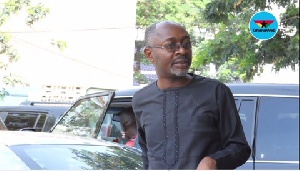Supreme Court of Ghana yesterday ignored an order made by the African Court for Human and People’s Rights (ACHPR) asking Ghana to halt efforts to retrieve 51.2 million Ghana cedis wrongfully paid to Alfred Agbesi Woyome.
The African Court on Human and People’s Rights (ACHPR) in Tanzania on November 24, 2017 ordered that government put on hold efforts to retrieve the money paid the businessman pending a determination of the substantive case he brought before the court.
“The court finds that the situation raised in the present application is of extreme gravity and urgency on the basis that should the applicant’s property be attached and sold to recover the GH¢51,283,480.59 the applicant would suffer irreparable harm if the application on the merits is decided in his favour…” the 11-member panel said.
Lawyers for the businessman yesterday presented the order to the Supreme Court asking that all proceedings relating to the repayment of the money be suspended.
This brought to two, the number of motions the court was to determine. While the first motion aimed to stay the proceedings, the other sought to arrest the ruling of the court on the motion for stay of execution.
Deputy Attorney-General, Godfred Yeboah Dame, opposed the application, saying the Treaty setting up the African Court even though has been ratified by Ghana’s Parliament, has not been incorporated into Ghana’s laws.
Delivering the decision of the 5-member panel, Justice Anin Yeboah said the businessman had failed to show any factual or legal basis for the court to hold on with its ruling.
The panel also unanimously dismissed the other application asking that all processes in relation to retrieval of the money be put on hold.
Deputy Attorney-General, Godfred Yeboah Dame, told the press after the proceedings that government will not cease attaching properties of the businessman.
He also found the ruling by the ACHPR strange, as there was no opportunity by lawyers representing the state to present their side of the story prior to the ruling.
“The ruling of the African Court came as a surprise to us; there was no hearing whatsoever and there was no notification to us on proceedings…we think that something went amiss [and] something fishy occurred,” he stated.
The Supreme Court in July began an inquiry into sources of income and assets of the businessman in order to recover the monies due to the state.
Mr Woyome in October this year prayed the Supreme Court to stay proceedings on the oral examination since he had filed for a review of the case.
But the Supreme Court dismissed his application for stay of proceeding seeking to halt the oral examination.
According to the court, presided over by a single Judge, Justice Alfred Benin, the application had no basis.
Earlier this month, the government began a valuation of Woyome’s properties in a quest to retrieve the GH¢51 M wrongfully paid to him.
Some security personnel and officials from the Ghana Valuation Board were sent to the Trasacco residence of Mr Woyome to conduct the valuation to build concrete evidence on his ability to pay the debt for his trial.
Mr Woyome was paid the GH¢51 million after claiming he helped Ghana raise funds to construct stadia for the hosting of the 2008 African Cup of Nations.
However, an Auditor General’s report released in 2010 held that the amount was paid illegally to him.
Subsequently, the Supreme Court in 2014 ordered Mr Woyome to pay back the money, after a former Attorney General, Martin Amidu, challenged the legality of the payments.
Following delays in retrieving the money, Supreme Court judges unanimously granted the Attorney-General clearance to execute the court’s judgment, ordering Mr Woyome to refund the cash to the state.
There had been previous attempts to orally examine Mr Woyome with Mr Amidu himself, in 2016 filed an application at the Supreme Court seeking to examine Alfred Woyome, on how he was going to pay back the money, after the Attorney General’s office under the Mahama administration, led by the former Minister for Justice, Marietta Brew Appiah-Oppong, discontinued a similar application.
In February 2017 however, Mr Amidu withdrew his suit seeking an oral examination, explaining that the change of government and the assurance by the new Attorney General to retrieve all judgement debts wrongfully paid to individuals, had given him renewed confidence in the system.

















